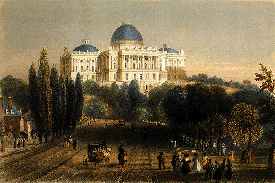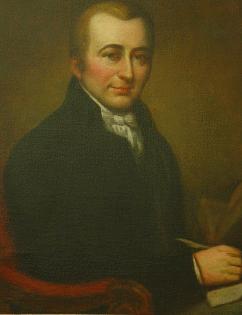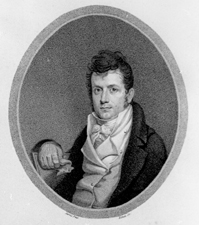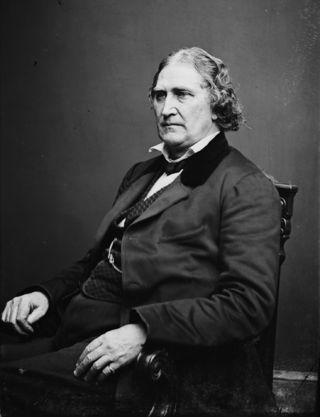
James McSherry (July 29, 1776 – February 3, 1849), was an American politician from Pennsylvania who served as a Federalist member of the U.S. House of Representatives for Pennsylvania's 5th congressional district from 1821 to 1823. [1]

James McSherry (July 29, 1776 – February 3, 1849), was an American politician from Pennsylvania who served as a Federalist member of the U.S. House of Representatives for Pennsylvania's 5th congressional district from 1821 to 1823. [1]
McSherry was born in Littlestown, Pennsylvania, to Irish immigrant Patrick McSherry and was educated at the Lancaster Academy. [2]
He fought in the War of 1812 in the defense of Baltimore, Maryland.
He was a founder of the Littlestown Railroad and the Gettysburg National Bank. [2]
He served in the Pennsylvania House of Representatives (1807–1812). He served as a member of the Pennsylvania State Senate for the 11th district from 1813 to 1817 and was the first Roman Catholic state senator in Pennsylvania. [2] He was a delegate to the Pennsylvania State Constitutional Convention in 1837 and 1838. In 1821, he was elected by the Federalist party to the Seventeenth United States Congress (1821–1823).
Defeated in his re-election bid, he returned to the Pennsylvania State House of Representatives (1824–1830; 1834 and 1835).
He died on February 3, 1849, and is interred at the Saint Aloysius Cemetery in Littlestown, Pennsylvania.
One of his sons, James McSherry Jr. was a lawyer and writer best known for his "History of Maryland", another, William McSherry was a Pennsylvania State Senator as a Whig and Democrat. His grandson, James McSherry became chief judge of the supreme court U.S. State of Maryland Court of Appeals.
The town of McSherrystown, Pennsylvania, is named in honor of his family. [2]

The 1816 United States presidential election was the eighth quadrennial presidential election. It was held from November 1 to December 4, 1816. In the first election following the end of the War of 1812, Democratic-Republican candidate James Monroe defeated Federalist Rufus King. The election was the last in which the Federalist Party fielded a presidential candidate.

The 17th United States Congress was a meeting of the legislative branch of the United States federal government, consisting of the United States Senate and the United States House of Representatives. While its term was officially March 4, 1821, to March 4, 1823, during the fifth and sixth years of James Monroe's presidency, its first session began on December 3, 1821, ending on May 8, 1822, and its second session began on December 2, 1822, to March 3, 1823. The apportionment of seats in the House of Representatives was based on the 1810 United States census. Both chambers had a Democratic-Republican majority.

Caesar Augustus Rodney was an American lawyer and politician from Wilmington, in New Castle County, Delaware. He was a member of the Democratic-Republican Party, who served in the Delaware General Assembly, as well as a U.S. Representative from Delaware, U.S. Senator from Delaware, U.S. Attorney General, and U.S. Minister to Argentina.

William Pinkney was an American statesman and diplomat, and was appointed the seventh U.S. Attorney General by President James Madison.

Alexander Contee Hanson was an American lawyer, publisher, and statesman. He represented the third district of Maryland in the U.S. House, and the state of Maryland in the U.S. Senate.

Thomas Clayton was an American lawyer and politician from Dover in Kent County, Delaware. He was a member of the Federalist Party and later the National Republican Party and the Whig Party. He served in the Delaware General Assembly, as Attorney General of Delaware, as Secretary of State of Delaware, as Chief Justice of the Delaware Supreme Court, as U.S. Representative from Delaware, and as U.S. Senator from Delaware. In 1846 he was one of two members of the United States Senate to vote against declaring war on Mexico.

James Asheton Bayard Jr. was an American lawyer and politician from Delaware. He was a member of the Democratic Party and served as U.S. Senator from Delaware.
The 1820–21 United States House of Representatives elections were held on various dates in various states between July 3, 1820, and August 10, 1821. Each state set its own date for its elections to the House of Representatives before the first session of the 17th United States Congress convened on December 3, 1821. They coincided with President James Monroe winning reelection unopposed.

William Hunter Jr. was an American politician and diplomat and owner of the Hunter House, now a museum.
Charles Brown was an American politician from Pennsylvania who served as a Democratic member of the U.S. House of Representatives for Pennsylvania's 1st congressional district from 1841 to 1843 and Pennsylvania's 3rd congressional district from 1847 to 1849. He also served as a member of the Pennsylvania House of Representatives from 1830 to 1833 and as a Pennsylvania State Senator for the 2nd district from 1838 to 1841.

John Tod was an American judge and politician who served as a Democratic-Republican member of the U.S. House of Representatives for Pennsylvania's 8th congressional district from 1821 to 1823 and for Pennsylvania's 13th congressional district from 1823 to 1824. He served as a member of the Pennsylvania State Senate for the 14th district from 1815 to 1818 including as Speaker from 1815 to 1816 and as a member of the Pennsylvania House of Representatives from 1810 to 1813 including two terms as Speaker.
Edward Brake Jackson was a U.S. Representative from Virginia, son of George Jackson and brother of John G. Jackson.
Francis White was a distinguished early American lawyer and politician in what was then the U.S. state of Virginia.
Rees Hill was a U.S. army colonel in the War of 1812 and a politician who served as a Republican and Democratic-Republican member of the Pennsylvania House of Representatives for Greene County from 1810 to 1813 and from 1814 to 1820, including as Speaker of the Pennsylvania House of Representatives in 1816 and 1819. He also served as a Democratic member of the Pennsylvania State Senate for the 18th district from 1821 to 1822 and the 20th district from 1823 to 1824.

The 1822–23 United States Senate elections were held on various dates in various states. As these U.S. Senate elections were prior to the ratification of the Seventeenth Amendment in 1913, senators were chosen by state legislatures. Senators were elected over a wide range of time throughout 1822 and 1823, and a seat may have been filled months late or remained vacant due to legislative deadlock. In these elections, terms were up for the senators in Class 2.

William McSherry was an American politician who represented Adams County, Pennsylvania in both the Pennsylvania House of Representatives and the Pennsylvania State Senate, initially as a Whig before transitioning to the Democratic party.